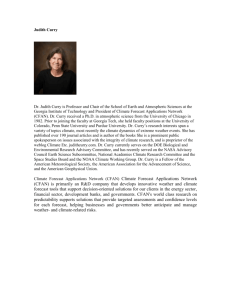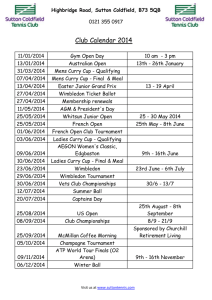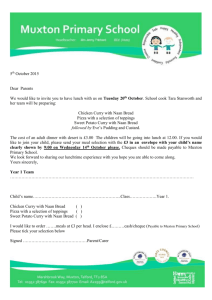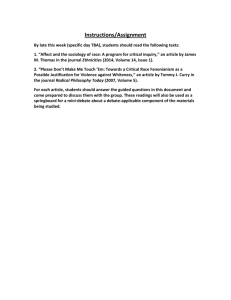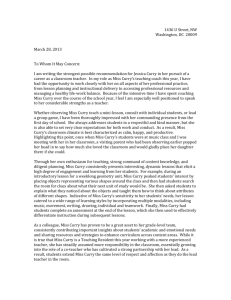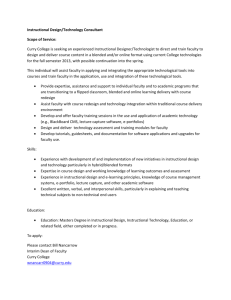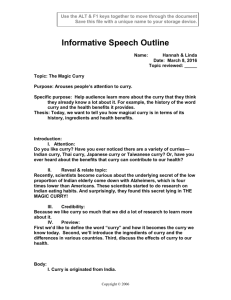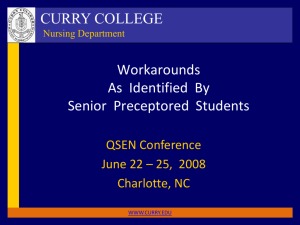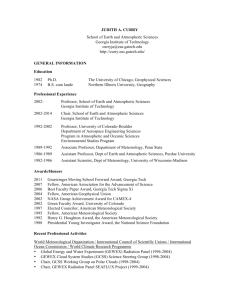Students with Learning Disabilities Transition to College Challenges
advertisement
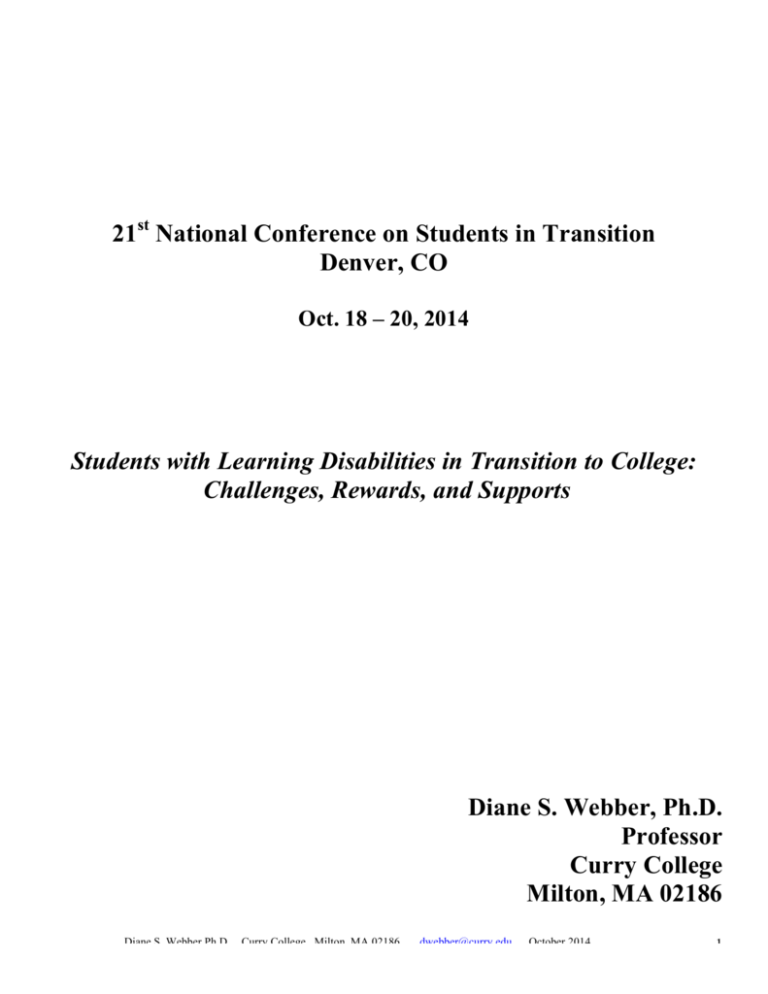
21st National Conference on Students in Transition Denver, CO Oct. 18 – 20, 2014 Students with Learning Disabilities in Transition to College: Challenges, Rewards, and Supports Diane S. Webber, Ph.D. Professor Curry College Milton, MA 02186 Diane S. Webber Ph,D. Curry College Milton, MA 02186 dwebber@curry.edu October 2014 1 Overview • What is a learning disability? • Kinds of LD & processing difficulties • Learning strategies • Classroom concerns • Discussion and questions Diane S. Webber Ph,D. Curry College Milton, MA 02186 dwebber@curry.edu October 2014 2 A Learning Disability … • is a neurologically-based disorder of processing information • impacts listening, thinking, speaking, reading, written language, spelling and/or math • often exists in the presence of notable strengths • is lifelong, but manifests differently over time but is not a… • type of mental retardation/low intelligence • psychiatric disorder • physical disability • lack of motivation Common Types of LD and AD/HD LANGUAGE-BASED LD Listening (Receptive Language) Easily overloaded by auditory input, especially directions or detail-filled talk Visual or kinesthetic (hands-on) channels are often stronger Reading (Receptive Language) Speed, accuracy, vocabulary, comprehension, main concept vs. detail Oral Expression (Expressive Language) Thinking of what to say; finding words; conceptualizing parts and whole; elaboration Written Expression (Expressive Language) Ideation, organization, sentence structure, grammar, spelling, proofreading Diane S. Webber Ph,D. Curry College Milton, MA 02186 dwebber@curry.edu October 2014 3 NON-VERBAL LD Social skills Can miss social cues; misinterpret non-verbal communication Part-whole understanding Miss the forest for the trees; focus on detail at expense of big picture in writing/reading comprehension Math Difficulty with math concepts; visual spatial understanding AD/HD Attention Deficit/Hyperactivity Disorder Attention Trouble maintaining attention, focusing for long stretches of time; occasional hyperactivity cases. Medication is common and can affect alertness, sleep, eating. Executive Function Difficulty with organizing, planning, starting, monitoring, remembering to do, completing, sense of time, studying effectively, keeping track of belongings and due dates Sources of Processing Difficulty Memory: Storage and Retrieval Input/output path: visual, auditory, kinesthetic; verbal or non-verbal; conceptual: organization of associations; retrieval fluency Short Term or Working Memory Trouble multi-tasking, such as listening and copying from the board simultaneously Processing Speed Slow compared to other abilities; extended time critical Visual-Motor Skills Trouble copying/writing quickly, tracking from question to answer sheet (scantron); poor handwriting Visual Detail Difficulty with charts, graphs, numbers, mathematical signs Sequencing Following directions, steps, or logic in order Auditory Sound awareness; breaking down auditory input Diane S. Webber Ph,D. Curry College Milton, MA 02186 dwebber@curry.edu October 2014 4 Developmental Education Concepts Scaffolding: Teach and assess in incremental steps within a larger context Universal Design: Inclusive classroom construction; consider all kinds of learners Feedback: Immediate, concrete, specific, frequent and balanced Models: Positive examples and/or rubrics of how to meet expectations Explicit (vs. implicit): Detailed and clear; written and oral Corrective (vs. punitive): Multiple chances vs. high stakes; strength-based Collaboration: Team-work, groups, co-construction Transitions to College – Differences between High School and College • Reduction in feedback • Structure of outside class time • Rules vs. choices • Teachers vs. professors • Responsibility for seeking assistance and advocacy • Nature of course assessment • Effort vs. outcome (product) Diane S. Webber Ph,D. Curry College Milton, MA 02186 dwebber@curry.edu October 2014 5 Developmental Teaching Strategies for the Classroom Instructor Metacognition: Awareness of individual strengths and weaknesses Syllabus: Explicit and detailed; calendar with dates and assignments due; post updates as schedule changes; checkpoints for long-term projects Homework: Explained at beginning of class; written Reading: Every class & in manageable doses; questions to prompt active reading Class Presentation: Varied; not just lecture: small group, demo, concrete examples from student experience, visual supports (keywords, diagrams) Engagement: Stand up and move time; change activities, active learning environment, student-centered Lecture Notes: Clear order; provide outline on Blackboard; concept diagrams Discussion/Student Participation : Prompts prior to class; partner share to start; small group with reporter; allow time to think; jot down questions and thoughts; wait longer for more hands Texts: On reserve; with good advance organizers, summaries Mnemonics: Explicitly show how to remember concepts, terms, etc. Study Guides: Help students see what you think is important Videos: Use guided questions; structured prompts Class Lists (names): Helps students find study partners, etc. Assessment: Frequent and varied ; multiple modes (papers, tests, projects, presentations) QUESTIONS and COMMENTS “Parents, professors, friends, etc. often give students unrealistic feedback about their performance which only serves to incapacitate them and stifle their development and growth as human beings.” “How do I cover my content when so many students have so many different learning needs?” “…the majority of students seem to come to a learning environment with very little real interest in learning and see college as a means to an end to get jobs and make money.” “At what point do we begin to enable students toward learned-helplessness, and when/where do we set limits so students can grow interdependently?” I have a student who… Diane S. Webber Ph,D. Curry College Milton, MA 02186 dwebber@curry.edu October 2014 6
